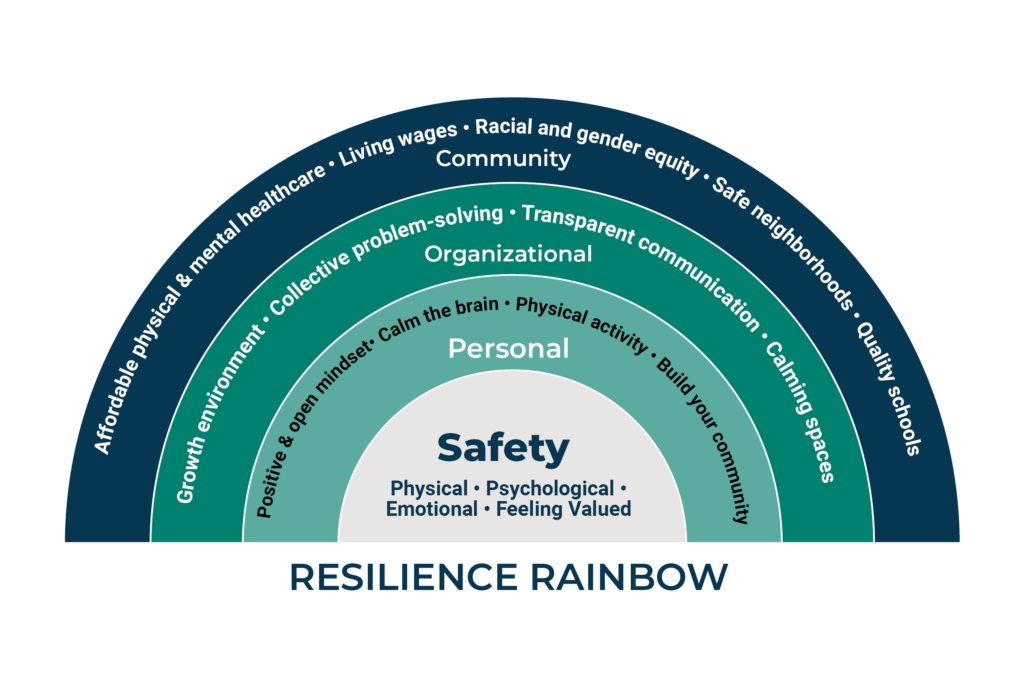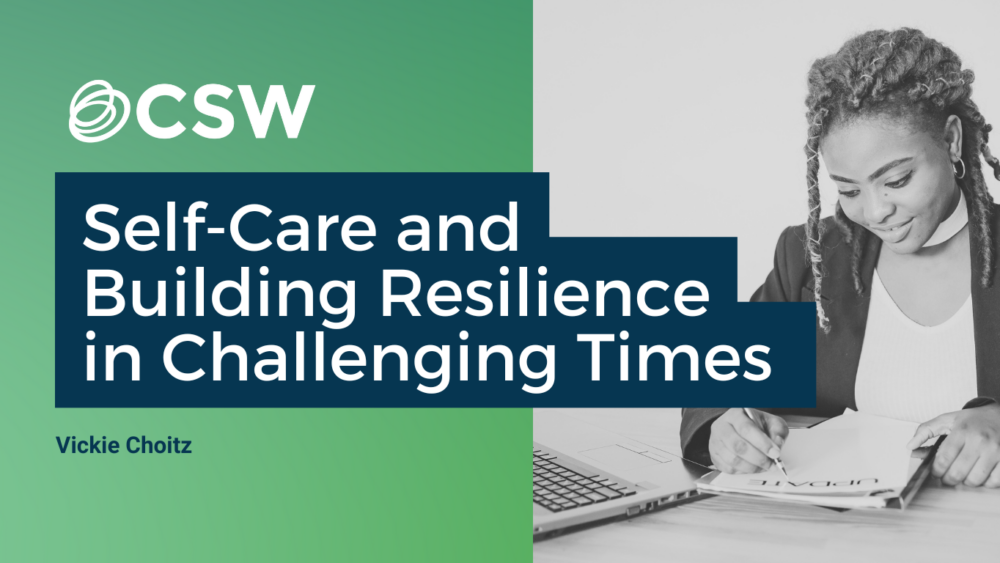Recently, a colleague compared the recent rapid major employment, policy, and funding changes in the federal government and the ripple effects in communities and nonprofit organizations to the COVID-19 pandemic experience. Both eras are marked by significant uncertainty and anxiety. Both are examples of collective trauma, defined as an “event [that] occurs when a society, culture, community or group is impacted by one traumatic event or the same series of traumatic events.”
Trauma can have serious negative consequences for our mental and physical health and has been correlated with clinical mental health conditions such as depression and anxiety, as well as physical health concerns including increased risk of heart conditions, diabetes, and autoimmune diseases, among other health challenges.
It is important when we experience trauma to regulate our neurological system by engaging in self-care, supporting each other with collective care, and building our resilience. It is critical to build resilience at multiple levels, as illustrated in CSW’s Resilience Rainbow:

Practicing Safety
Resilience building is rooted in our brains and bodies feeling safe. When you are triggered by trauma, focus on calming your brain to help it feel safe; this is what is meant by “regulating” your nervous system. When trying to help someone else regulate and get to a point of psychological safety, use the LAPIS model – see chapter 3 in CSW’s Trauma and Resilience Quick Guides.
Methods for practicing safety:
- Ensure your physical environment is safe: Remove safety hazards such as tripping hazards, black ice, etc.; check your vehicle for safety, i.e., tires are aired up to recommended levels, all systems are working properly, etc. A safe home and surroundings provide both physical and psychological safety.
- Engage in deep breathing: Deep breathing helps with psychological safety by calming the body and mind, reducing stress and improving emotional balance. Research shows it slows the heart rate and decreases physiological indicators of stress.
- Practice mindfulness: Practicing mindfulness helps you stay present and reduce stress by shifting focus away from worries about the past or future.
- Use meditation: Meditation helps quiet the mind and improve focus by promoting a state of calm awareness.
- Enhance feeling valued—for both yourself and others: An easy and effective way to do this is to practice gratitude. Intentionally note things you are grateful for; you can use a gratitude journal to jot them down. This helps you focus on the positive, improves our mental health, and can even improve your physical health. Thank and give yourself a pat on the back for completing tasks at work or home, carving time out for self- and collective care, and getting through every day the best you can. Genuinely thanking others more often is a two-fer, in that it makes you feel more positive, and it helps the thanked person feel valued and appreciated.
Resources for practicing safety:
- Calm: Meditation & sleep app
- Headspace: Meditation & sleep app
- InsightTimer: Meditation for sleep & anxiety app
- Mindful.org: Mindfulness & meditation resources
- Grounding Strategies to Calm Your Nervous System
- RAIN: A Practice of Radical Compassion
Personal Resilience Practices
Personal resilience includes a variety of self-care practices encompassing the calming and regulation techniques used in practicing safety, as well as exercise, healthy eating, sleep, spending time with friends and family, and other similar practices. This video excerpt from a recent CSW training on resilience building highlights several self-care and personal resilience building practices and tools.
Methods for practicing personal resilience:
- Get some exercise: Exercise releases endorphins and reduces tension. Even a short walk can help regulate emotions and enhance well-being.
Harvard Medical School: More evidence that exercise can boost mood - Practice healthy eating: Diets rich in whole foods, fruits, and vegetables are associated with lower depression and anxiety, while processed foods and sugar can exacerbate stress by increasing insulin resistance and visceral fat.
American Society for Nutrition: Nutrition and Stress - Get enough sleep: Sleep supports cognitive functions like attention, learning, and memory, while insufficient sleep can make it harder to handle even minor stressors and may distort our perception of reality.
Columbia University: How Sleep Deprivation Impacts Mental Health - Spend time with friends and family: Prioritizing uplifting relationships while setting boundaries with draining ones protects emotional well-being.
Resources for practicing personal resilience:
- Olga Phoenix’s Self-Care Wheel
- Trauma Stewardship: An Everyday Guide to Caring for Self While Caring for Others
- Sleep Cycle: Sleep Tracker to get healthier sleep
Organizational Resilience Practices
Humans are social beings; we feel supported and connected when we engage with others we trust and value; being in community with others is a key resilience-building strategy. Organizational resilience includes organizations where we work, as well as other types of groups we engage with, such as our religious communities, clubs and informal friend groups, among others.
Methods for practicing organizational resilience:
- Join or start a club: Being part of a club offers a consistent space for shared interests, personal growth, and teamwork. Whether it’s a book club, a running group, or a professional network, clubs provide structure and a sense of purpose that can be especially grounding in uncertain times. Being part of a group or club helps us personally and is the glue that holds together communities.
- Attend a community event: Community events bring together diverse groups, fostering new connections and broadening perspectives. These gatherings create opportunities for collaboration, cultural exchange, and collective problem-solving.
- Participate in a mentorship: Taking others under one’s wing or learning from experienced colleagues fosters a culture of growth and support. This exchange of knowledge strengthens organizational and community ties, promotes integration, and enhances resilience in changing environments. Harvard Business Review: A Better Approach to Mentorship
Resources for practicing organizational resilience:
Start by exploring opportunities within your current organizations, such as wellness programs, mentorship initiatives, or worker support networks that can strengthen resilience and build connections. Beyond the workplace, consider these options:
- Meetup and Similar Apps: Platforms like Meetup, Eventbrite, or Bumble BFF help people find local events and interest-based groups, fostering both professional and personal connections.
- City and Town Websites: Most local government sites have event calendars listing public meetings, workshops, and cultural events that encourage civic engagement.
- Coffee Shop Bulletin Boards: A classic yet effective way to discover grassroots community gatherings, local workshops, and group activities.
Community Resilience Practices
Community resilience includes the wider socio-political context in which we live. As the CSW Resilience Rainbow illustrates, resilient communities have the resources they need to thrive including enough food, shelter, money, and healthcare; safety; and opportunity.
Methods for practicing community resilience:
- Find Volunteer Opportunities: Volunteering strengthens community resilience by fostering social bonds, enhancing civic engagement, and building local capacity to address challenges.
NAMI: How Volunteering Improves Mental Health - Join Community Gardens and Clean-Up Events: Consider participating in local gardening initiatives or clean-up events to foster neighborhood pride and environmental stewardship.
- Attend School and Library Programs: According to one qualitative study, schools are often the community hub where people can find stability during crisis. Enhancing local education initiatives elevates community knowledge and overall quality of life. Many schools and libraries offer tutoring programs, educational workshops, or community classes that help build our community resilience and may be looking for volunteers.
Resources for practicing community resilience:
- Community Centers and Libraries: Often post volunteer opportunities on bulletin boards or websites.
- Religious Organizations: Many churches, mosques, synagogues, and temples coordinate local outreach programs.
- AmeriCorps and Foster Grandparents Programs: National programs offering volunteer opportunities in schools, communities, and nonprofit organizations, supporting education, disaster response, and more.
- Communities in School (CIS): A nonprofit connecting students with community resources to support academic success and address challenges like poverty and mental health.
- Volunteer Match: An online platform that connects volunteers with local and virtual opportunities across various causes, making it easy to get involved.
Additional Reading
- NYT 10 Ways to Keep Your Mind Healthy in 2025
- Stay Well MI Self-Compassion Exercise
- “What Is Collective Trauma? How it could be impacting us.” by Danielle Render Turmaud, Ph.D., NCC, Psychology Today
- “Collective Trauma,” in Culturally-Informed Trauma and Grief Toolkit, by the American Psychological Association
- “How to heal the ‘mass trauma’ of Covid-19,” by Ed Prideaux, BBC, February 3, 2021
- “Collective Trauma: Respond Effectively as an Organization,” American Medical Association STEPS Forward Toolkit, December 12, 2023
- Role of Organizational Resilience and Psychological Resilience in the Workplace
- Raising the resilience of your organization, by Dana Maor, McKinsey, October 12, 2022
- CSW Self-care and Resilience Building video
For additional tools, resources, and information, you can sign up for CSW’s Trauma and Resilience at Work newsletter.
Meet the Author
Vickie Choitz
Vickie Choitz is the Director of Trauma and Resilience at Work team, advancing workplaces and workforces that are culturally responsive, trauma-informed, healing-centered, resilience-building, and supportive of mental well-being. Continue Reading >>




Comments are closed.